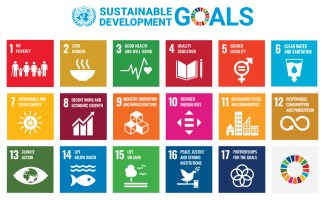A critical look at the areas of the SDGs which need expanding and areas which have been overlooked such as nuclear weapons, trade agreements, the arms trade, biodiversity, extinction, tax justice, freedom of the press, digitalisation, cybersecurity and many others.
The 17 Sustainable Development Goals cover a multitude of broad issues including poverty, hunger, education, gender equality, and environment. Better World Info critically analyses overlooked areas and the need to further expand the goals.
Many of the SDGs are currently seriously behind target, or even in reversal. In fact, we are on track to meet only 17% of targets by 2030. The 2024 SDG Report revealed that progress on 50% of the targets is weak, and 30% have either stalled or actually worsened - a reassessment and expansion of the SDGs is urgently needed.
Many of the current failings and omissions are down to the unwillingness of states and large companies which hold the biggest influence to implement and monitor the goals.
Major military powers such as the USA, Great Britain, and Russia have no interest in the abolishment of nuclear weapons. Authoritarian states such as Saudi Arabia and China do not want to give their citizens a voice with free elections. Large fossil fuel companies are blocking the energy transition and preventing sustainable environmental protection.
Other hugely influential factors such as unfair global trade agreements, the dominance of multinational corporations, and the destabilisation of financial markets are not addressed by the SDGs, nor recognised as barriers to sustainable development.
Neoliberal capitalism feeds off profits, greed, power, and corruption. They have taken precedence over social interests for far too long. As long as capitalism is king, unchecked pollution and climate change will continue unchecked, as well as vast economic inequality, and austerity, tax havens, repression, the inhumane treatment of refugees, and modern slavery.
The annual State of Food Security and Nutrition in the World report by the UN revealed that the number of people suffering chronic hunger has barely changed over the past year. 733 million people faced hunger in 2023 – the equivalent of one in 11 people.
Be sure to check out our comprehensive guide to the SGDs where you will find over 800 links to background information, the need for review and reform, important news sources, publications, and key resources.
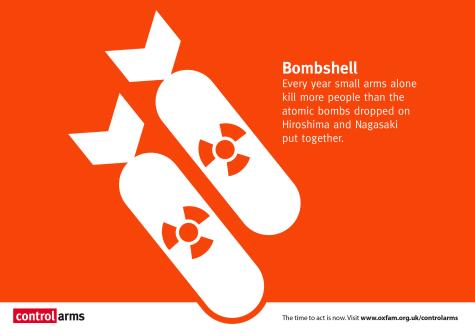
Militarisation, Arms Exports, and Nuclear Weapons
As the biggest threat facing humanity, nuclear weapons are only very indirectly referred to in the SDGs under Goal 16, which promotes peaceful and inclusive societies for sustainable development and the reduction of all forms of violence.
Not one of the SDGs calls for the complete abolition of nuclear weapons. When we consider that nuclear weapons have the ability to destroy all life on Earth this is a terrifying omission.
The SDGs also do not adequately address global defence spending which is currently at a record high of $2.2 trillion. Increasing international tensions, militarisation, the military-industrial complex, and the greed of private weapons contractors have caused military budgets to bloat at the expense of other societal needs such as education, healthcare, and infrastructure which are drained of financial resources.
International arms trade agreements are another notable omission. Strong global arms trade policies are essential to prevent weapons from finding their way into unstable and volatile areas. Arms exports fuel conflict, human rights abuses, violations of international humanitarian law, repression, displacement, death, and suffering.
The business of arms exports alone is worth a staggering $112 billion annually.
How can we possibly aim for sustainable development while the world is being flooded with weapons of death and destruction?
The principle of Goal 16 is to "Build peaceful, just and inclusive societies" but without conflict prevention, de-escalation, disarmament and nonviolent resolutions we can't possibly hope to hit this target. One quarter of the human population are currently living in areas experiencing violent conflict - the equivalent of two billion people. While this is the case, all of the other SDGs are compromised.
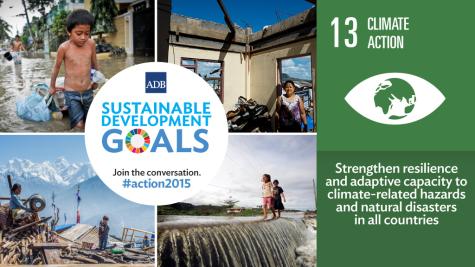
Climate Action, Life on Land, and Below Water
A key deficit of the SDGs is the lack of emphasis on the urgency of climate change. While Goal 13 of the SDGs addresses “combatting climate change and its impacts,” it does not stress the immediate threat, merely the importance of resilience and adaptation.
We are drastically off track from limiting global warming to 1.5°C. Emissions need to already be decreasing, and by 2030 need to be cut in half in order to achieve this goal. The current pace and scale of climate action is entirely insufficient to address climate change. Extreme weather events are already significantly more frequent and intense. No region on Earth is unaffected.
Goal 13 also fails to specify quantifiable targets for emission reductions or time frames to work towards. This contrasts with the scientific recommendations of the Intergovernmental Panel on Climate Change (IPCC), which advocate for a drastic reduction in greenhouse gas emissions by 2030 and net-zero emissions by 2050. Without specific and monitored targets, governments and industry will continue with impunity and the energy transition becomes impossible.
The SDGs are interconnected in their nature. One cannot succeed without the other. Failure to meet Climate Action targets has negative implications for the Clean Water goals, Sustainable Cities, Life Below Water, Life on Land, Reduced Inequalities, Clean Energy, Hunger, Responsible Consumption, and Peace. The implementation of climate protection measures therefore requires a holistic view, and coordination with the other development goals.
The absence of biodiversity as a goal is another gaping oversight. Although Life Under Water and On Land are featured, neither of them explicitly mentions species, habitat, or ecosystem protection. We are currently experiencing a rate of species loss 1,000 to 10,000 times higher than the natural extinction rate.
More than 45,000 animal species worldwide are threatened with extinction. Loss of coral reefs, overdevelopment, agriculture and deforestation have led to a 47% decline in natural ecosystems.
Animal rights are another important issue which is not addressed by the SDGs. Every creature on Earth has the right to exist free from pain, suffering, fear, and abuse. Practices such as the illegal wildlife trade, factory farming, industrial agriculture, animal testing, and the fur industry must be challenged. The view that animals are here solely for the exploitation of humans is not only morally wrong but also hinders sustainable development.
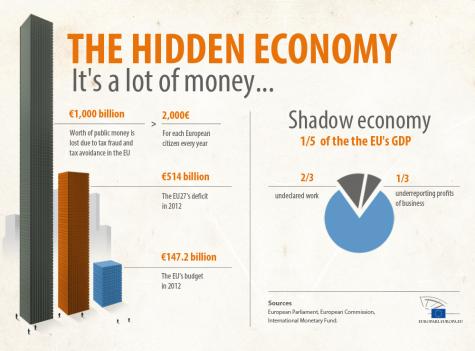
Social Justice
Corruption and tax havens undermine trust in our institutions and make it more difficult to implement the SDGs. Current global tax justice is inadequate and failing to control spiralling inequalities. Although the SDGs do include reduced inequalities in goal 10, the problem of tax avoidance and evasion by multinational companies is not directly addressed.
Globally, 25% of public spending is lost to corruption. It effects every corner of our society purging money from healthcare systems, education, infrastructure, social protection, governance, and the energy transition.
There are now 117 million people who have been forcibly displaced from their homes, and over 36 million refugees. We need to meet the needs of refugees and migrants as well as finding solutions for the root causes. Safe and orderly migration is included in goal 10, but there is no mention of addressing the specific challenges and needs of these people who are caught in dire circumstances.
Other notable absences from the social aspects of the SDGs include lack of mental health goals, senior citizens, culture, the role of communities, and the importance of science and research.
One in four people will struggle with mental illness in their lifetimes, and with increasing numbers of people enduring conflict, displacement, loss of livelihoods, human rights abuses, poverty, and many other issues we expect this number to increase. Quality and accessible mental health care will improve the quality of life for millions, and therefore positively impact our society as a whole.
With ageing populations in many parts of the developed world, we must not overlook this valuable but vulnerable demographic of society. The SDGs focus on future generations, however there are many social issues which impact senior citizens such as social isolation, poverty, lack of social security, ageism, and costs of healthcare.
The SDGs mention promoting tolerance and cultural diversity, but they do not address in detail the preservation or protection of cultural identities, languages, and knowledge. Cultural activities and the arts contribute to social integration, fortify cultural heritage, tackle social injustice, bring prosperity, raise awareness of important issues, and can form the beating heart of a community.
We believe that the SDGs should focus more on the role of cities and local communities as they are the ones facing the impacts of global challenges, and play a key role in implementing the SDGs on a local level. There should also be more emphasis on the importance of science, scientists, and research, as without investment in these fields we will not be able to overcome any of the world's greatest challenges.
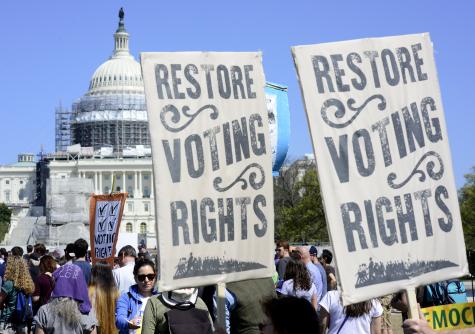
Politics and Democracy
Despite the essential role that democracy plays in achieving sustainable development, it is not mentioned at all in Agenda 2030. Goal 16 mentions building effective, accountable, and inclusive institutions at all levels and access to justice for all. But the emphasis on democracy as a tool for peace and sustainable development is missing. Citizen participation, political education, the involvement of women, equality, and the rule of law are all crucial factors for achieving the SDGs.
Freedom of information and freedom of the press are key in democratic, fair governance and elections. In a world where fake news and disinformation are becoming increasingly common, free and independent news sources as well as media literacy are essential for a functioning democracy and an informed citizenry.
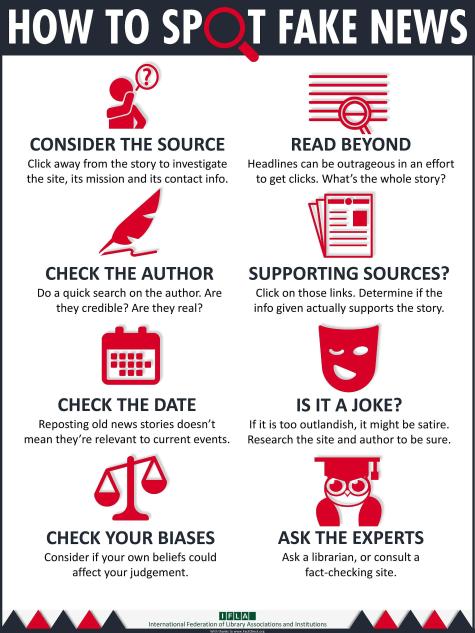
Goal 4 places great emphasis on inclusive and quality education for all as well as lifelong learning, but civic education is not mentioned. Political understanding is crucial in the creation of an active and informed population who are able to participate in democratic processes and make educated decisions.
Political awareness helps citizens to understand the world, our rights and responsibilities, and strive for a fairer and more sustainable planet.
The need for transparency is essential, again it is not stressed as an important factor in the SDGs. It has proven to be the number one tool in the fight against corruption and in the strengthening of citizens' trust in public institutions.
Governmental transparency has now become much easier with the concept of open source and modern technology. Open government allows free access to government-held information, and for citizens be informed about and involved in government proceedings.
Technology and Digitalisation
Automation, computers, robotics, and artificial intelligence are changing our world at a breathtaking pace, yet these technological advancements barely feature in the SDGs. The potential advantages and use of these tools to solve our biggest problems has been overlooked entirely.
We must also be aware of the risks and dangers that unregulated development of technology could have. Artificial intelligence and robotics are already fundamentally changing the way we work and live. Issues such as cybersecurity and data protection are completely overlooked despite global challenges already arising.
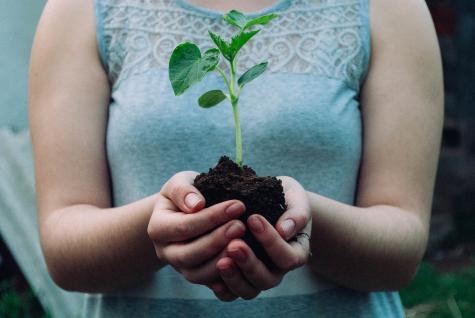
Sharpening the SDGs for a Better World
We fully support the SDGs as an important framework for a better world. However, due to the number of shortcomings and lack of specific timeframes we believe that the goals must be further developed and adapted to stay on par with the complex challenges of our time.
As today's global problems become increasingly connected and multi-layered, we must ensure that issues such as pandemics, the consequences of climate change, and digitalisation are integrated into the goals.
Given how rapidly things change in today's modern world, a critical reassessment of the SDGs would ensure that deficits are addressed, and the goals expanded to incorporate missing areas.
The unequal distribution of wealth and access to opportunities between the global north and south must also be taken into consideration. Geographical location, political circumstances, and availability of resources all affect a countries ability to implement action towards the goals.
One thing for sure is that if large companies and world leaders continue to block sustainable environmental protection, comprehensive human rights, the energy transition, and disarmament projects, the implementation of the SDGs will fail.
Strict timelines, sanctions, and legally binding penalties for non-compliance are the only way to promote consistent pursuit of the goals. However, without global consensus there is little hope of ending impunity.
By highlighting the deficits and shortcomings of the SDGs we hope to raise awareness and instigate change. Through greater synergy, cooperation, and the sharing of knowledge, our aligned goals of peace and a better world for future generations will become achievable.
Be sure to check out our comprehensive guide to the SGDs where you will find over 800 links to background information, important news sources, publications, and key resources.
Author: Rachael Mellor licensed under CC BY-ND 4.0 is based on the original German article by Maximilian Stark & Norbert Stute 16.10.23
